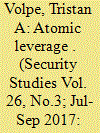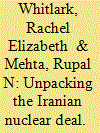| Srl | Item |
| 1 |
ID:
153181


|
|
|
|
|
| Summary/Abstract |
Nuclear proliferation is not a binary outcome with uniform consequences, but instead spans a continuum of latent capacity to produce nuclear weapons. At various thresholds of technical development, some countries leverage nuclear latency to practice coercive diplomacy. How and when does nuclear technology provide a challenger with the most effective means to extract concessions in world politics? This article claims that compellence with nuclear latency puts a challenger on the horns of a credibility dilemma between demonstrating resolve and signaling restraint, and identifies a sweet spot for reaching an optimal bargain where the proliferation threat is credible while the assurance costs of revealing intent are low. Historical studies of South Korea, Japan, and North Korea validate this Goldilocks principle and find that it consistently reflects the ability to produce fissile material. Contrary to conventional wisdom about proliferation, nuclear technology generates political effects long before a country acquires nuclear weapons.
|
|
|
|
|
|
|
|
|
|
|
|
|
|
|
|
| 2 |
ID:
157350


|
|
|
|
|
| Summary/Abstract |
How does the acquisition of latent nuclear capabilities—in the form of enrichment and reprocessing facilities—affect a state’s military security and bargaining power? On the one hand, nuclear latency might serve as a “virtual deterrent” against would-be aggressors, as well as a bargaining chip in international negotiations. On the other hand, some research holds that states cannot deter military challenges without at least a deliverable nuclear device. Other scholarship suggests that a state’s pursuit of latency invites nonproliferation sanctions and preventive strikes. We address this debate by quantitatively investigating the conditions when latency benefits or burdens states in their international interactions. To do so, we analyze a dataset of latency measures and a variety of military and bargaining outcomes. The results suggest that latency invites coercion without producing deterrence. Our findings imply that post–Joint Comprehensive Plan of Action (JCPOA), latency is more likely to undermine Iran’s economic and military well-being than it is to benefit its prosperity or security. That, in turn, suggests that the JCPOA will not increase Iran’s deterrent capability or its international influence, a fact that should temper fears about the negative consequences of the agreement.
|
|
|
|
|
|
|
|
|
|
|
|
|
|
|
|
| 3 |
ID:
165275


|
|
|
| 4 |
ID:
156585


|
|
|
|
|
| Summary/Abstract |
This article analyzes Japan's development of civilian nuclear energy and its potential for developing nuclear weapons in the late 1960s. First, it examines two technological studies of Japan's nuclear fissionable material production capability: one sponsored by the Japanese government and the other sponsored by the US government. A comparative analysis of them reveals that the Japanese study did not investigate the full range of feasible measures toward Japan's nuclear armament. Further scrutiny of Japanese nuclear-energy development in relation to its policy-making structure at that time draws out the following arguments: (1) Japan's civilian nuclear program clearly contributed to its acquisition of a latent nuclear weapon potential; (2) Japan had not deliberately developed the latent capability, which reflected the lack of coordination among political actors; (3) Japan increased its dependence on the United States in the nuclear-power field, making its pursuit of nuclear weapons politically more difficult. This case study of Japan illustrates not only the intricate relationship between the development of civilian nuclear power, the development of nuclear-weapon potential, and the proliferation of nuclear weapons, but also the effects of the state’s nuclear-policy-making structure on its nuclear posture.
|
|
|
|
|
|
|
|
|
|
|
|
|
|
|
|
| 5 |
ID:
150969


|
|
|
|
|
| Summary/Abstract |
On July 14, 2015, the Islamic Republic of Iran and the international community, led by the United States and the European Union, signed the Joint Comprehensive Plan of Action (JCPOA) ensuring for the next 10–15 years that Iran's nuclear program was entirely peaceful. In the subsequent months, the International Atomic Energy Agency (IAEA) verified that all signatories to the agreement had fulfilled their obligations. The deal allows Iran to retain a substantial portion of its nuclear infrastructure—specifically its ability to indigenously enrich uranium into fissile material, the material required in nuclear weapons.
|
|
|
|
|
|
|
|
|
|
|
|
|
|
|
|